From the 98% of Indonesians who say religion is very important in their lives to the 96% of Cambodians who burn incense, people in the countries surveyed generally appear to be highly religious, based both on the self-assessed, overall importance of religion in their lives and on a variety of specific religious practices.
The survey offered people many opportunities to describe the practices they follow, and some patterns are evident. In general, adults in Singapore appear to be among the least religious in the six countries surveyed; they are the least likely to say religion is very important in their lives as well as the least likely to visit a house of worship on a regular basis.
Sri Lankan adults, meanwhile, appear to be among the most religious or spiritual by several measures, and their religious behaviors often extend to practices not traditionally associated with their own religious community. For example, 62% of Muslims in Sri Lanka say they pray or offer their respects to the Hindu deity Ganesh; in no other country do more than 3% of Muslims do this.
However, practices differ across religious groups, and no single religious group is consistently the most religious across all measures. For instance, Muslims are the group most likely to report praying daily, while Buddhists are the most likely to use incense.
On a handful of measures, older individuals are more inclined than other people in their countries to say that they follow specific religious practices.
This chapter also looks at meditation, using special objects for blessings or protection, and visiting mediums to communicate with spirits.
Personal importance of religion
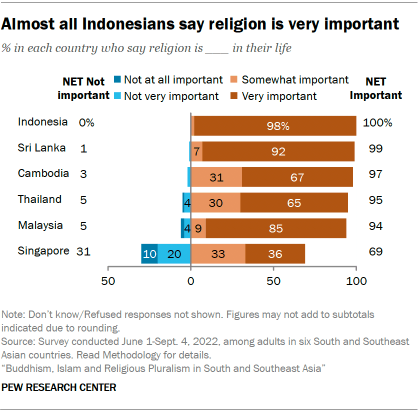
In every country except Singapore, more than nine-in-ten adults say that religion is at least somewhat important in their lives. And large majorities in these countries say that religion is very important to them, including 98% of Indonesians. In Singapore, by contrast, only 36% of adults say religion is very important in their lives.
Overall, Muslims and Christians are more likely than Hindus and Buddhists in the region to say religion plays a very important role in their lives, although many Buddhists and Hindus also take this view. Young Buddhist adults (ages 18 to 34) are less likely than older Buddhists to say religion is very important in their lives.
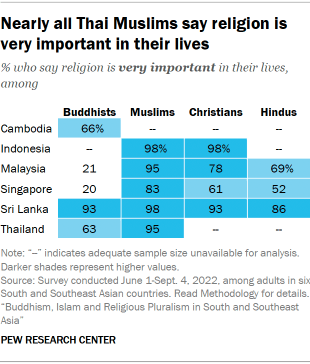
Within Singapore, the religiously unaffiliated are the least likely to place importance on religion. Indeed, 35% of the country’s “nones” say religion is not at all important in their lives.
On average, women in the region are slightly more inclined than men to say religion is very important to them. For instance, in Sri Lanka, 96% of women say this, compared with 88% of men.
In general, adults with more education are less likely than other adults to say religion plays a very important part in their lives. For example, 53% of Thai adults who have completed at least a secondary education place great importance on religion, compared with 71% of other Thais.
Rates of prayer
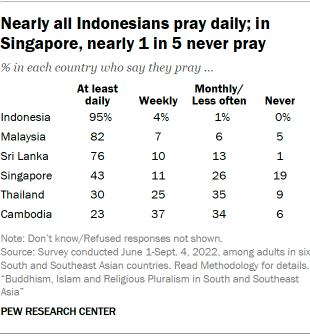
While most people in the countries surveyed say they pray with some regularity, only in Indonesia (95%), Malaysia (82%) and Sri Lanka (76%) do majorities pray daily. Meanwhile, 19% of Singaporeans say they never pray.
Muslims are the religious group that is most likely to report praying daily, though majorities of Christians and Hindus across the surveyed countries also say they pray every day. While smaller shares of Buddhists in most countries pray daily, about three-quarters of Sri Lanka’s Buddhists say they do this.
Very few religiously unaffiliated Singaporeans pray daily (7%). In fact, 52% of Singapore’s “nones” say they never pray.
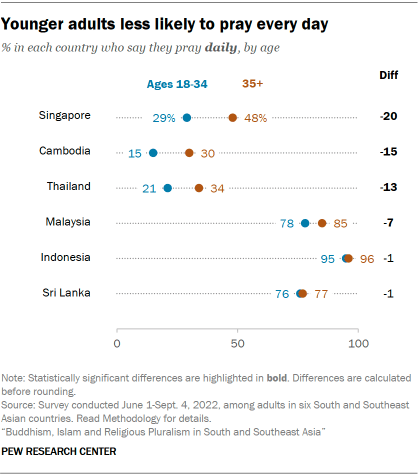
Younger adults (ages 18 to 34) are less likely than their elders to pray daily. For instance, 21% of younger Thais say they pray daily, compared with 34% of older Thais.
Across the countries surveyed, men are less likely than women to say they pray daily. The biggest divide is in Sri Lanka, where 65% of men and 86% of women report praying daily.
Among Buddhists, those with more education are somewhat less likely to say they pray daily. For example, 14% of Cambodian Buddhists who have completed secondary education pray daily, while 24% of other Buddhists do this.
Thai Muslims least likely to pray 5 salah daily
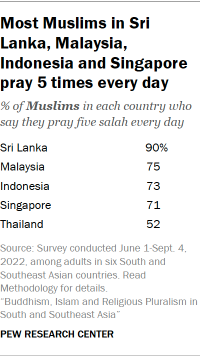
Not only are Muslims the most likely to pray daily, but in several of the countries surveyed, upward of seven-in-ten Muslims say they pray five salah every day. The lone exception is Thailand, where about half of Muslims pray all five salah daily.
Muslim women are more likely than Muslim men to pray five salah each day. For example, 78% of Muslim women in Indonesia do this, compared with 67% of Indonesian Muslim men.
Older Muslim adults also are more likely than those younger than 35 to pray five times a day. In Singapore, 77% of Muslims ages 35 or older pray five salah every day, compared with 54% of Muslim adults under 35.
Praying or offering respects to figures from other religions
The survey asked respondents whether they currently pray or offer respects to several deities or founder figures – including those associated with the respondent’s own religious community as well as other religious traditions.
“Offering respects” is commonly understood in the region as the act of worshipping or venerating deities. It can include a variety of practices, such as burning incense, making food offerings, or making wishes to a deity. It is often expressed through gestures like bowing one’s head or putting one’s hands together; these are gestures of great respect, though they may not align with Western notions of formal prayer.
Muslims almost universally pray or offer their respects to Allah – in Islam, considered the only God – as do Christians with Jesus Christ. Most Buddhists revere Buddha, the religion’s founder, who Buddhists believe achieved enlightenment. Likewise, the vast majority of Hindus pray or offer their respects to Ganesh (a deity associated with removing obstacles) and Shiva (often referred to by Hindus as the god of destruction).
While people across the countries surveyed generally are most connected to the deities or founder figures of their own religion, there is a relatively high degree of cross-religious reverence. For instance, substantial minorities of Buddhists say they pray or offer their respects to Allah in Sri Lanka (39%), Malaysia (22%) and Singapore (18%).
Meanwhile, Jesus and Mother Mary – believed by Christians to be the mother of Jesus Christ – are the most widely revered figures among the region’s Christians, but some Christians in Malaysia (14%) and Singapore (13%) pray or offer respects to Guanyin (or the Guanyi Bodhisattva, whom Buddhists consider to have been enlightened and now to aid those who are suffering). And roughly one-quarter of Christians in Indonesia and Malaysia pray or offer respects to the protector spirits or guardian deities of the area where they live.
This type of interreligious reverence toward founder figures and deities is especially common in Sri Lanka. For instance, majorities of Sri Lankan Christians pray or offer respects to Buddha (61%), a practice that is far less common among Christians in other countries. Similarly, 57% of Sri Lankan Buddhists say they pray or offer respects to Jesus Christ.
In general, Hindus are more likely than members of other religious communities to pray or offer their respects to figures from outside their traditional pantheon: Most Hindus in Sri Lanka (84%) and Singapore (66%), for example, pray or offer respects to Jesus. And 62% of Singapore’s Hindus pray or offer their respects to Guanyin. By contrast, Muslims are typically the least likely community to cross religious lines in revering founder figures or deities. However, Sri Lanka’s Muslims stand out as being particularly open to other religious traditions: Most say they pray or offer respects to Buddha, Shiva or Ganesh.
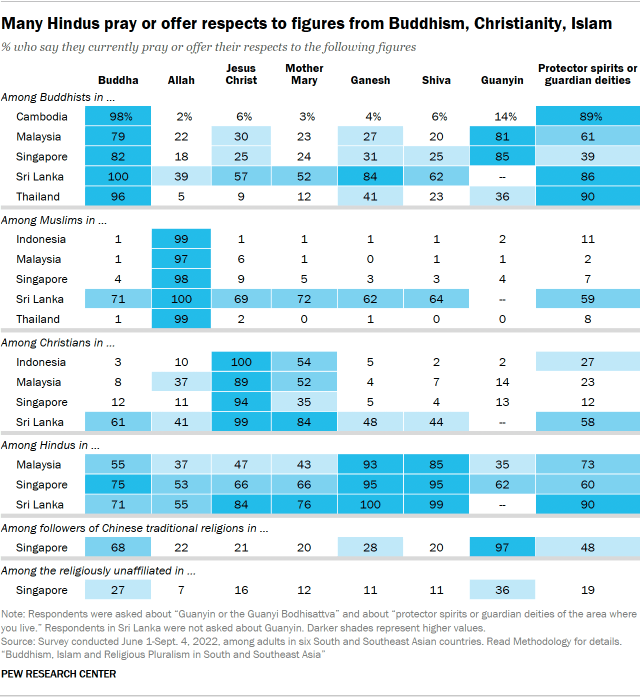
Among followers of Chinese traditional religions in Singapore, nearly all pray or offer respects to Guanyin (97%), and 68% pray or offer their respects to Buddha. Singapore’s “nones” are less likely to revere various figures, but still, 36% pray or offer respects to Guanyin and 27% do this to Buddha.
Altars or shrines at home
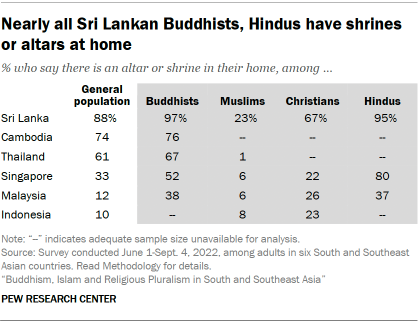
Of the six countries surveyed, Sri Lanka has the highest proportion of adults who say they have altars or shrines in their home (88%), though solid majorities in Cambodia (74%) and Thailand (61%) also have home altars or shrines. By contrast, only about one-in-ten people surveyed in Malaysia and Indonesia say they have an altar or shrine in their home.
In general, among Buddhists and Hindus in each country, half or more report having an altar at home, including nearly universal shares of Sri Lanka’s Buddhists (97%) and Hindus (95%). Meanwhile, Malaysia’s Buddhists (38%) and Hindus (37%) are less likely than those in other countries to have altars or shrines at home.
About one-quarter of Christians in Malaysia, Indonesia and Singapore – and fully two-thirds of Sri Lanka’s Christians – have a shrine at home. Muslims in the countries surveyed, meanwhile, are consistently the least likely to have an altar or shrine. Even in Sri Lanka, only 23% of Muslims have a shrine at home, as do just 1% of Thai Muslims.
In Singapore, 68% of those who follow traditional Chinese religions say there is an altar or shrine in their home – more than most other religious communities in the country. And Singapore’s “nones” are more likely than the country’s Muslims to have one (16% vs. 6%).
Burning incense

Buddhists in the countries surveyed are more likely than people in other religious communities to say they ever burn incense. This includes near-universal shares of Buddhists in Cambodia (99%) and Sri Lanka (97%). Many Hindus also burn incense, including 93% in Sri Lanka and 67% in Singapore.
Several religious traditions use incense as a way to sanctify spaces. For example, after Buddhists light incense during sacred activities, they may place it into a container (called a censer) in front of a divine statue.
Muslims and Christians, in general, are much less likely than Buddhists to burn incense. In Indonesia, for instance, just 6% of Muslims and 4% of Christians burn incense. In Sri Lanka, however, this practice is common even among Muslims (73%) and Christians (62%).
In Singapore, followers of Chinese traditional religions are the most likely to say they burn incense (86%). And almost four-in-ten of the Singapore’s “nones” burn incense – greater than the shares of the country’s Christians (15%) and Muslims (8%) who do the same.
Visiting houses of worship
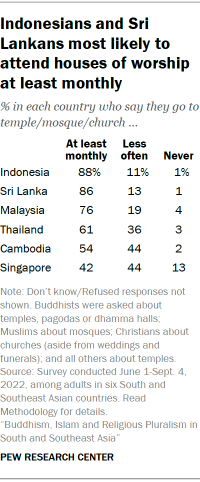
The survey asked respondents how frequently they visit religious sites or houses of worship. Buddhists were asked about going to temples, pagodas or dhamma halls; Muslims about attending mosque; Christians about going to church (aside from weddings and funerals); and all other respondents, including Hindus, about going to temple.
In every country but Singapore, more than half of adults attend temples, mosques or churches at least monthly. Indonesia (88%), Sri Lanka (86%) and Malaysia (76%) stand out as the places with the largest share of adults who report visiting houses of worship at least monthly. In Singapore, 42% say they go to these religious sites regularly. (Indonesia and Malaysia are the only countries in the survey where most people say they attend houses of worship at least weekly.)
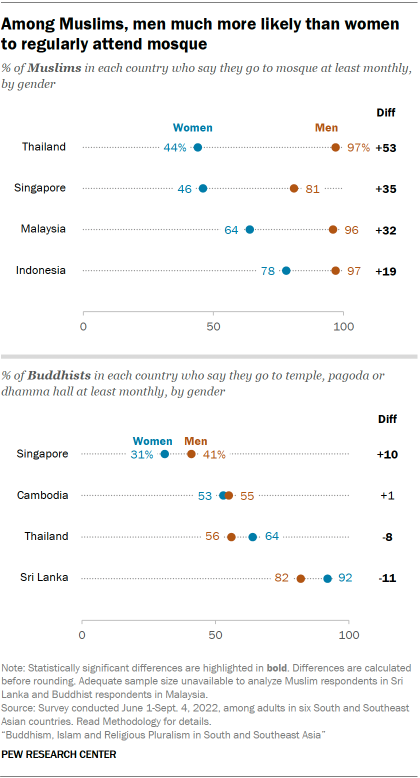
Christians and Hindus generally are the most likely to go to houses of worship monthly or more often, while Buddhists typically are among the least likely. However, in Sri Lanka, Buddhists (87%) are just as likely as Christians (86%) and only slightly less likely than Hindus (95%) to visit their religious institutions monthly.
In line with traditional expectations within Islam, Muslim men are substantially more likely than Muslim women to go to the mosque monthly or more often. For instance, while Muslim men in Thailand nearly universally attend the mosque at least monthly (97%), fewer than half of Muslim women in the country do this (44%).
By contrast, there is no consistent difference in attendance patterns by gender among Buddhists across the countries surveyed.
Meditation
In Sri Lanka and Thailand, most people say they practice meditation (62% each). In other countries, about a quarter or fewer say they ever meditate.
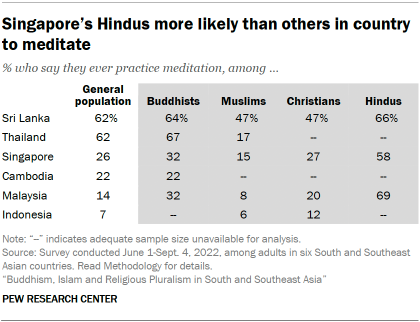
Regionally, Hindus are the religious community that is most likely to practice meditation, though Buddhists generally are more inclined to meditate than Christians or Muslims. For instance, in Singapore, Buddhists (32%) are less likely than Hindus (58%) but more likely than Muslims (15%) to say they ever meditate.
In Singapore, roughly one-in-five followers of Chinese traditional religion and religious “nones” ever practice meditation.
Among Buddhists, those with more education are more likely to say they ever meditate. For example, 38% of Singaporean Buddhists with a college education meditate, compared with 23% of other Buddhists in Singapore. Also among Buddhists, those who pray daily are more likely than other Buddhists to ever meditate.
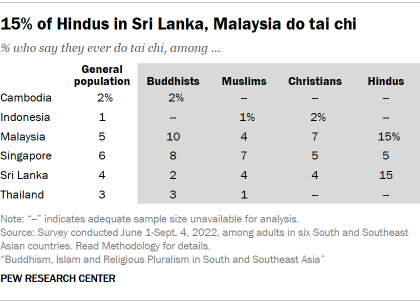
Few in countries surveyed do tai chi
The Chinese martial art of tai chi, which has been described as “meditation in motion,” is practiced by relatively few people in the countries surveyed. Even among those in Singapore who follow Chinese traditional religions, only 5% say they ever do tai chi.
Using special objects for blessings or protection
In every country surveyed, fewer than half of adults say they ever use special objects for blessings or protection. While the survey did not ask respondents to specify the objects they use, these objects may include amulets made of various materials (such as metal, wood or stone). They could come from vendors, or from sites like temples or shrines where the objects may have received sacred blessings.
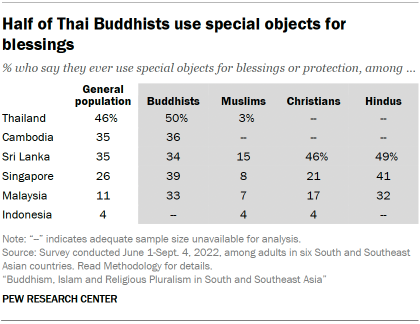
Buddhists and Hindus are the religious groups most inclined to use special objects for protection, including about half of Hindus in Sri Lanka and Buddhists in Thailand. In Sri Lanka, 46% of Christians also say they do this.
People in the Muslim-majority countries of Malaysia (11%) and Indonesia (4%) are much less inclined to seek blessings through such objects. Overall, Muslims across the region are the least likely to do this.
Visiting mediums to communicate with spirits
Across the countries surveyed, relatively few people say they have gone to a medium to communicate with spirits. The practice is most common in Cambodia (25%) and Thailand (22%).
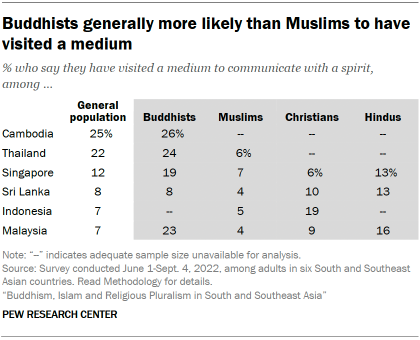
Buddhists tend to be among the most likely to have visited a medium to communicate with a spirit, while Muslims generally are among the least likely. In Singapore, Buddhists and followers of Chinese traditional religions are equally likely to have gone to a medium (both 19%).
Among Buddhists, those who pray daily are slightly more likely than other Buddhists to have visited a medium to communicate with a spirit. In Singapore, for example, 27% of Buddhists who pray daily have visited a medium, compared with 16% of other Buddhists in the country.




